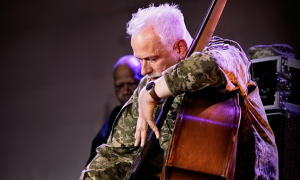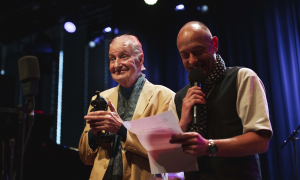Home » Jazz Articles » Profile » Carol Sloane: Setting New Standards
Carol Sloane: Setting New Standards
Sloane has almost always gotten the big things right. Listen to any of her records and you will hear a singer with excellent intonation, superb time and a genuine feel for the meaning of a lyric.
Still, talent, judgment and craft are rarely limitless commodities, and most artists eventually reach a point where their work begins to plateau or even decline. So when I Never Went Away, Carol Sloane's latest album, roughly her 24th, appeared on the HighNote label at the end of 2001, most fans and critics probably assumed the law of diminishing marginal returns would apply. After all, this is an internationally acclaimed singer whose career stretches back to the 1950s and whose work, particularly in the last fifteen years, has drawn near-universal praise. Could Carol Sloane's singing really get any better? The answer, it turns out, is yes.
I Never Went Away does not reflect a change in Carol Sloane's style so much as a refinement of her art. Sloane has almost always gotten the big things right. Listen to any of her records and you will hear a singer with excellent intonation, superb time and a genuine feel for the meaning of a lyric. Happily, her placement, timbral control and diction have never been better. Of course, technical improvements around the margins would not be enough to turn heads. What really separates Sloane's recent work, both on record and live, is the consistency with which she illuminates the details of a song. Sloane's greatest performances have always occurred when her musical and lyrical concentration have been tightly focused. When her attention wanders, whether due to dissatisfaction or unfamiliarity with the material, the accompaniment or the surroundings, the results tend to be pleasantly generic. However, when she is on her game, Sloane engages in jazz singing of the highest order—richly nuanced and emotionally compelling. On I Never Went Away, she is not only on her game but also at the top of it. Her concentration does not lapse even once resulting in not only the most satisfying album of her career, but one of finest examples of jazz singing in recent memory.
Like her idol and close friend

Carmen McRae
vocals1920 - 1994
Although she places the utmost importance on words, Carol Sloane does not allow the need for lyric interpretation to inhibit improvisation. Having earned her stripes in the 1950s and 1960s, she has something of a pre-Betty Carter sensibility, which means that while Sloane might venture far out on the musical limb, she doesn't treat improvisation as an exercise in abstraction. A good number of jazz singers improvise as if they are slicing up a chord sequence with a carving knife. Sloane, by contrast, changes the contours of song. She makes curves out of straight lines and transforms flat plains into hills but always with a clear grasp of the song's overall structure. Sloane understands that a melody, even an improvised one, is more than a series of notes played in succession; it is the expression of a musical idea.
She essays those musical ideas with a voice that seems to do pretty much everything she asks of it. Listen to her hypnotic reading of "I See a Million People," the Una Mae Carlisle/Robert Sour tune that opens I Never Went Away. Accompanied by

Paul Bollenback
guitarb.1959

Kenny Washington
drumsb.1958

Frank Sinatra
vocals1915 - 1998
The same set of values can be heard in her approach to time. Sloane seems to swing as naturally as she breathes. On

Billy Strayhorn
piano1915 - 1967
Of course, those same critics often fail to appreciate that in vocal jazz it's not so much about the quality of the voice as it is the quality of the ears attached to it, and Carol Sloane has, figuratively speaking, big ears. Although she doesn't read music, she hears it (check out her blindfold test). On "To You," a gorgeous

Thad Jones
trumpet1923 - 1986

Jon Hendricks
vocals1921 - 2017

Count Basie
piano1904 - 1984

Duke Ellington
piano1899 - 1974

Betty Carter
vocals1929 - 1998

Anita O'Day
vocals1919 - 2006

Joe Williams
vocals1918 - 1999

Annie Ross
vocals1930 - 2020

Oscar Peterson
piano1925 - 2007
Discussions of vocal jazz over the last twenty years have centered around three questions. The most often asked question has been whether a jazz singer will ever be able to connect with the general non-jazz public. Diana Krall and others have settled that controversy. The second question has been whether there were any new horizons left for jazz singers to explore. Cassandra Wilson and others have resolved that debate. The least discussed, but arguably most important, question is whether any jazz singers working today could produce the kind of timeless, highly personal work that would warrant their placement in the vocal jazz pantheon. Carol Sloane has pretty much answered that one. As vocal jazz moves into a new century, it does so not only with new stars and new trailblazers, but also new legends. Thankfully, as I Never Went Away proves, Carol Sloane's legend is still being written.
Tags
Profile
Carol Sloane
Mathew Bahl
Carmen McRae
Paul Bollenback
Kenny Washington
frank sinatra
Billy Strayhorn
Annie Ross
Comments
PREVIOUS / NEXT
Support All About Jazz
 All About Jazz has been a pillar of jazz since 1995, championing it as an art form and, more importantly, supporting the musicians who make it. Our enduring commitment has made "AAJ" one of the most culturally important websites of its kind, read by hundreds of thousands of fans, musicians and industry figures every month.
All About Jazz has been a pillar of jazz since 1995, championing it as an art form and, more importantly, supporting the musicians who make it. Our enduring commitment has made "AAJ" one of the most culturally important websites of its kind, read by hundreds of thousands of fans, musicians and industry figures every month.






 Buy Now
Buy Now





















